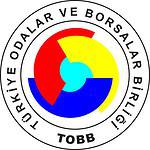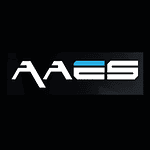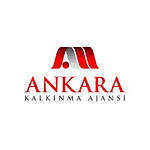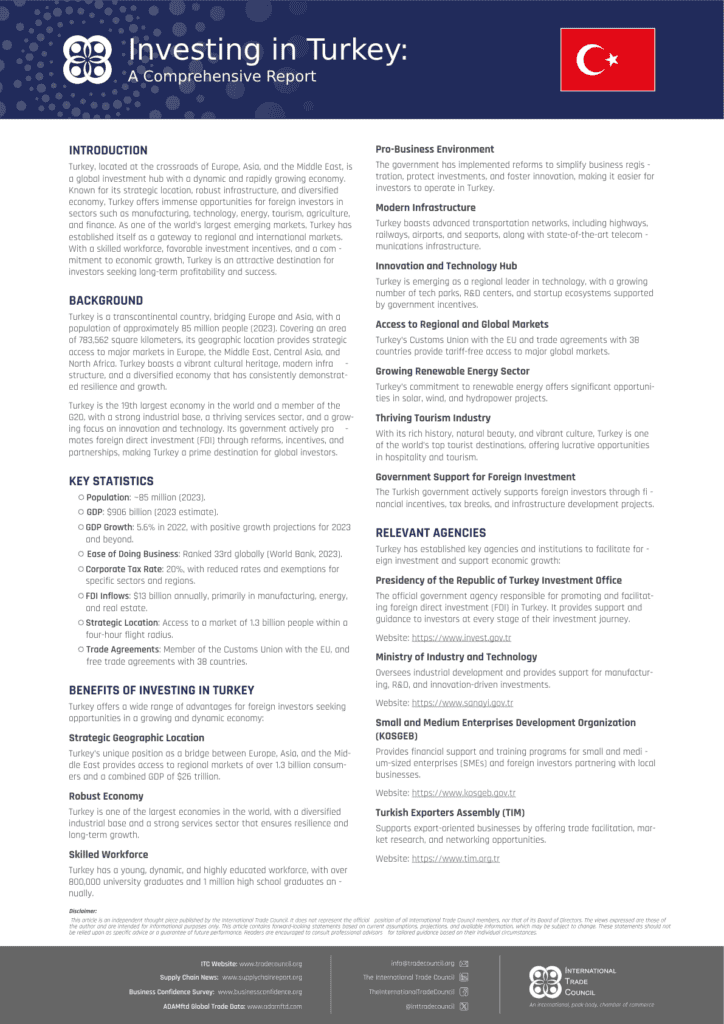- Type of Government: Unitary presidential republic
- Population: Approximately 85 million (2024 estimate)
- GDP: USD 1.03 trillion (2023 estimate)
- Corporate Tax Rate: 25% (2023)
- Personal Income Tax Rate: 15% to 40% (progressive rate)
- Major Exports: Automobiles, machinery, textiles, electronics, iron and steel, chemicals
- Major Imports: Machinery, mineral fuels (including oil), chemicals, vehicles, iron and steel, plastics
Doing Business with Turkey
A comprehensive guide to doing business, exporting, investing, and manufacturing in Turkey.
Exporting to Turkey offers significant opportunities due to its strategic geographic position, large consumer base, and diverse economy. Below is a step-by-step guide outlining the process.
1. Understand the Turkish Market
- Identify demand for your product.
- Research local competitors and pricing.
- Work with local partners, agents, or distributors.
2. Check Turkey’s Import Regulations
- Verify tariffs using the Customs Tariff Schedule.
- Ensure compliance with Turkish standards (labeling, packaging, safety).
3. Classify Your Goods with HS Codes
- Identify the appropriate HS code for your product.
- Determine applicable tariffs and non-tariff barriers.
4. Determine the Tariff and Taxes
- Take note of the VAT rate (generally 1% to 18%).
- Check qualify for preferential treatment under trade agreements (e.g., Turkey-EU Customs Union).
5. Prepare Export Documentation
- Commercial Invoice
- Packing List
- Certificate of Origin
- Bill of Lading (BOL)
- Customs Declaration Form
6. Arrange Shipping and Logistics
- Select a reliable freight forwarder.
- Secure shipping insurance.
7. Clear Turkish Customs
- Submit required documents to Turkish customs.
- Pay duties, VAT, and fees.
Importing goods into Turkey involves adhering to customs regulations and ensuring compliance with local standards.
1. Obtain a Customs Registration Number
- Register with the Customs and Trade Ministry to receive a Customs Registration Number (CRN).
2. Calculate Import Duties and Taxes
- Consult the Tariff Schedule.
- Check qualification for preferential tariffs under the Turkey-EU Customs Union.
3. Submit an Import Declaration via the BILGE System
- Submit declaration electronically through the BILGE system.
Key Government Contacts
- Ministry of Trade: https://www.trade.gov.tr
- Turkish Standards Institution (TSE): https://www.tse.org.tr
Incorporating a company in Turkey involves selecting the right business structure and registering with authorities.
1. Choose the Business Structure
- Limited Liability Company (LLC): Min. capital TRY 10,000.
- Joint Stock Company (JSC): Min. capital TRY 50,000.
- Liaison Office: For market research only.
2. Deposit the Minimum Capital
- Deposit capital into a Turkish bank account. It will be blocked until registration is complete.
3. Register with the Trade Registry Office
- Submit Articles of Association (notarized).
- Details will be published in the Turkish Trade Registry Gazette.
4. Register for Tax and Social Security (SGK)
- Obtain a Tax Identification Number (TIN).
- Register with the Social Security Institution (SGK) for employee benefits.
Turkey is a strategic location for manufacturing with access to European and Asian markets.
1. Find a Suitable Location
- Identify Organized Industrial Zones (OIZs) for ready-built infrastructure and tax incentives.
2. Acquire Necessary Permits
- Construction Permit
- Environmental Impact Assessment (EIA)
- Operational Permit
3. Apply for Investment Incentives
- Incentives include VAT exemptions, corporate tax reductions, and land allocation.
The Turkish Patent and Trademark Office (Türk Patent) manages trademark registrations.
1. Trademark Search and Nice Classification
- Conduct search via the Türk Patent database.
- Select classes under the Nice Classification System.
2. Publication and Certificate
- Acceptance results in a 2-month publication in the Official Bulletin.
- If no opposition, a certificate is issued, valid for 10 years.
1. Mandatory Mediation
- Mandatory for commercial payment claims before litigation.
2. Arbitration
- ISTAC (Istanbul Arbitration Center) is common for international disputes.
1. Social and Cultural Factors
- Etiquette: Firm handshakes, professional titles, and personal trust are vital.
- Language: Turkish is official; English is common in business centers.
2. Foreign Exchange
- Currency: Turkish Lira (TRY).
- Manage risk through hedging or using USD/EUR for large contracts.
3. Taxation
- Corporate Tax: Standard rate 25% (varies by year/incentive).
- VAT: Standard 18%.
Ask our Experts on Doing Business in/with Turkey
If you’re looking to do business or invest in Turkey, we can provide expert guidance, market insights, and valuable connections to help you navigate the local landscape. Contact us today to discover how we can assist in making your venture a success.










